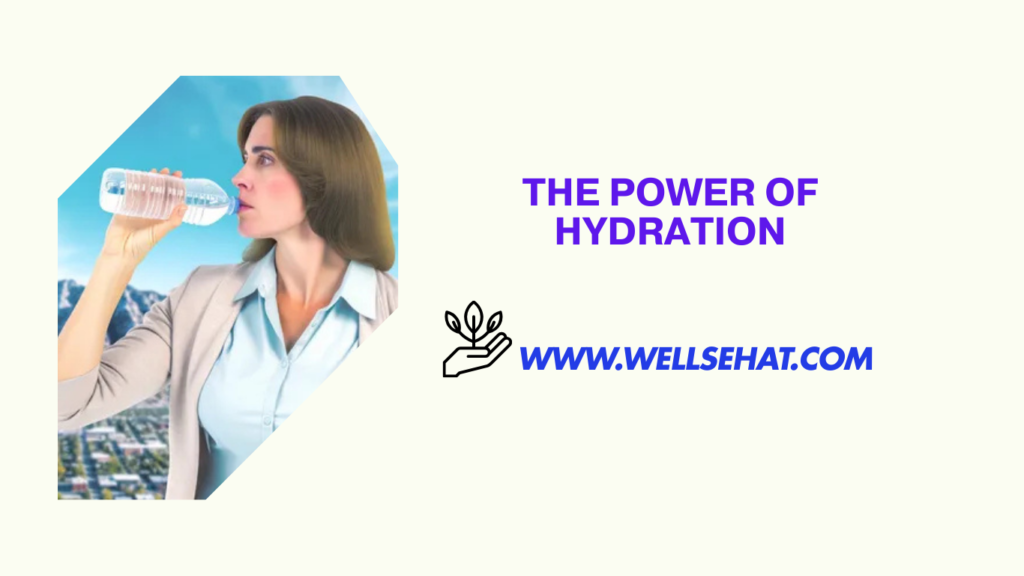Water is normally taken for granted despite being one of the most important ingredients for health. It will be recalled that the human body is composed of roughly sixty percent water and it is involved actively in different human body functions such as regulation of body heat, digestion of food, and the existence of cells. Water is a major necessity yet the average individual does not take enough water on a daily basis. In this article, we will read about what is meant by this link between adequate water intake and proper hydration, what are the advantages of properly hydrated organisms, and how one can maintain a proper hydration rate during the day.
The Role of Water in the Body
Water is involved in most of the physiological functions in the body They include H2O. It also aids in physiological cooling by sweating and respiration, if one is under the sun or engaged in a sporting activity. It also helps to lubricate the joints, especially in conditions whereby it acts as a shock absorber for organs and tissues with the responsibility of minimizing instances of breakdown. Water also plays a role in digestion because it is a fluid necessary in the process of digestion so as to facilitate digestion and absorption of nutrients in the gut.
In addition, it is important as a solvent of nutrients and oxygen in the process of their transportation to molecules. Blood is mainly the water solution and it has the unique quality of transporting nutrients as well as oxygen to various organs of the body and helps in the proper functioning of internal organs. Moreover, water helps the body to expel waste products in the form of urine, thus helping the kidneys to function properly. When we deprive our body of water these procedures may experience some setbacks and this may lead to various health complications.
The Benefits of Staying Hydrated
Health would improve so would the need to remain properly hydrated in the right proportion. An improved body performance is one of the earliest consequences of hydrating one’s body. From exercise to sports and even performing routine tasks, water increases capabilities, vitality, and even resistance in the body. Conversely, dehydration brings weakness, slows down of body’s physical coordination, and is susceptible to accidents.
This is also very important with reference to the aspect of cognition since adequate water in the body is critical to healthy cognitive processes. Research has demonstrated that as little as a 2% loss in body water can lead to loss of focus, poor memory, and poor temper. By drinking water, one can be in a position to boost his or her cognitive speeds, memory, and full focus. This is especially important especially today when the pace at which people act and make decisions requires clear and effective thinking.
Further, a moderate level of hydration means that skin health is also to some degree maintained. In this case when one’s body is fully hydrated then the skin will look healthier supple and full. Lack or moderate water intake causes skin dryness, and flakiness and usually results in skin dullness. Skin maintenance works as a result of the fluids and consumption of sufficient water as it can even help minimize the formation of fine lines and wrinkles on the skin.
Read More… Superfoods Uncovered What They Are and How to Incorporate Them into Your Diet
How Much Water Do You Need?
The above factors show that how much water each person requires may significantly depend on his age and gender, the level of his physical activity, as well as the climate he deals with. One such call is the so-called “8×8” rule that prescribes 8 glasses of water with 8 ounces each per single day. The National Academies of Sciences recommends that men should consume about 3.7 liters (13 cups) of water daily from both fluids and food and children 2.7 liters (9 cups) per day.
Therefore, including sufficient water consumption in your daily life regimen doesn’t have to be a problem. Here are some practical tips to help you stay on track:
First, take and use a filtered water bottle, during the day. This simple step puts a reminder on your wrist and it becomes easy to drink water anywhere you go. The goal in h2go is to refill the bottle several times a day and set personal challenges according to the individual’s water intake requirement.
Second, use your phone or better still try to download any hydration application that will help you to be reminded when it is time to take some water. This is especially important when you often forget to take liquids when caught up in work or other related chores. Gradually, you will be able to create a new practice out of these times and end up drinking water all day.
Water also finds its way into the foods that we take because taking foods rich in water increases the fluid levels in our bodies. Horticultural crops containing water include cucumber, watermelon, orange, and strawberries which can also be sources of water in the human body. A lot of soups and broths can also count toward your daily water intake, particularly during winter.
Conclusion
The importance of hydration cannot be overstated. Water is essential for numerous bodily functions, impacting everything from physical performance to cognitive health. By making a conscious effort to stay hydrated, you can enhance your overall well-being and improve your quality of life.
